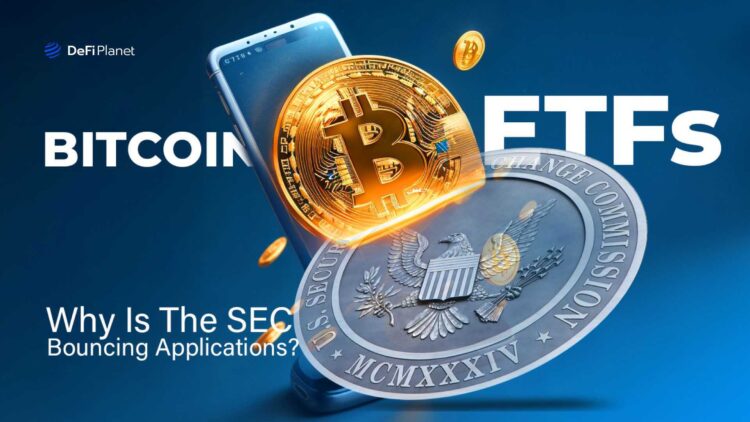There hasn’t been a single approved Bitcoin spot ETF available for trading in the United States. This isn’t due to a lack of filings for this investment asset class, but rather because the Securities and Exchange Commission (SEC), the regulatory body responsible for approving ETFs traded in the United States, has not deemed any of the approximately dozen Bitcoin spot ETF filings suitable for public trading.
The SEC’s reluctance to approve a Bitcoin spot ETF is preventing traditional finance (TradFi) from becoming involved with the largest cryptocurrency by market capitalization.
This unyielding stance begs the question, “Why?” Are there underlying issues at play, or is this simply a strategic maneuver by the regulatory body?
Before exploring the question further, let’s take a closer look at why Bitcoin spot ETFs are such a significant development.
What Is Appealing About Bitcoin Spot ETFs?
Exchange-Traded Funds (ETFs) have gained popularity among traditional investment options due to their cost-effectiveness and tax efficiency. These funds track the value of various securities, such as stocks, bonds, and other assets, without requiring direct ownership of the underlying tracked assets.
Similarly, a Bitcoin ETF can track the spot price of Bitcoin, Bitcoin futures contracts, or other derivative Bitcoin contracts. When you invest in a Bitcoin ETF, you are not directly buying and holding Bitcoin. Instead, you are investing in a fund that tracks Bitcoin and Bitcoin-related investments as the underlying assets.
The growth of the cryptocurrency market has piqued the interest of a diverse set of investors. However, some feel more confident in the traditional system, which offers regulatory oversight on investments. Additionally, the need to understand concepts like cryptocurrency wallets, private keys, and blockchain technology creates unnecessary complexities when investing in Bitcoin. This complexity often discourages average investors from exploring these new opportunities.
A Bitcoin ETF changes this dynamic by offering investment in Bitcoin with explicit regulatory oversight and without the need to understand the underlying technology. Bitcoin ETFs function similarly to traditional ETFs on stock exchanges.
ProShares made headlines in 2021 when it received approval from the SEC to issue the first publicly traded Bitcoin ETF in the United States. Since then, more Bitcoin ETFs have joined the US financial markets. However, these ETFs only track Bitcoin futures contracts or related investments, not the direct spot price of Bitcoin.
A Bitcoin spot ETF directly mirrors and responds to the price of Bitcoin, and is primarily influenced by market sentiment and news related to Bitcoin. It will feel like holding Bitcoin, except you’re not actually holding it.
Not only will you gain direct exposure to trading Bitcoin, but you will also be doing so within a regulated environment without worrying about crypto scams or the need to concern yourself with direct asset security.
With all these outlined positives of Bitcoin spot ETFs, why is the SEC rejecting applications and preventing investors in the United States from accessing them?
Here’s What the SEC Thinks About Bitcoin ETFs
While the SEC has not been entirely opposed to Bitcoin ETFs; it has consistently approved only those linked to Bitcoin futures. While other versions of Bitcoin ETFs, such as those from ProShares, Grayscale, Valkyrie, and VanEck, have achieved public success, the regulator is yet to approve any applications for Bitcoin spot ETFs.
The SEC has justified its stance based on the lack of transparency in the cryptocurrency market and the perception that it is susceptible to heavy manipulation without a clear source of truth.
The regulator argues that granting approval and regulating a Bitcoin spot ETF could pose problems due to concerns about potential fraud within the market. The agency’s repeated rejections of Bitcoin spot filings have clarified its position.
Notable Bitcoin ETF Application Rejections

Grayscale
In 2016, Grayscale became the first institutional investment fund manager to file for a Bitcoin spot ETF. However, the company withdrew its application due to concerns about an “underdeveloped regulatory environment.”
Nevertheless, in October 2021, Grayscale submitted a request to convert its Grayscale Bitcoin Trust (GBTC) into a Bitcoin spot ETF. Unfortunately, in June 2022, the SEC rejected Grayscale’s application, citing concerns about Grayscale’s ability to prevent potential Bitcoin fraud, which could undermine consumers’ access to such an asset class.
VanEck
VanEck filed for a Bitcoin spot ETF in 2018 but withdrew the application the following year. The investment manager filed again in December 2020. This filing was made shortly after the departure of former SEC chair Jay Clayton, but it had the same outcome as the previous ones.
The SEC has rejected VanEck’s Bitcoin ETF proposal twice, in November 2021 and March 2023. The regulator cited insufficient anti-fraud measures, similar to other rejected filings.
One River
In 2021, One River filed for a Bitcoin spot ETF, intending to issue a carbon-neutral Bitcoin ETF to offset the carbon footprint associated with its Bitcoin holdings.
However, just like previous filings, the SEC turned a deaf ear to the institution’s bid.
In May 2022, the regulator rejected the application due to concerns about the lack of a comprehensive surveillance-sharing agreement with a regulated market of significant size and an inability to prevent fraudulent practices.
Global X
Global X filed for a Bitcoin spot ETF in July 2021 and appointed the Bank of New York Mellon (BNYM) as the trustee. The SEC rejected Global X’s application deeming it unsuitable for issuance due to the absence of a fraud prevention framework and the inability to adequately protect investors and the public interest.
Notably, the SEC has rejected other Bitcoin spot ETF proposals from firms such as Ark Invest, Valkyrie, Fidelity Investments and WisdomTree.
Latest Developments on Bitcoin Spot ETF Applications
The SEC’s consistent rejections have not deterred the influx of new applications. On June 15, 2023, BlackRock, globally recognized as the world’s largest asset manager, formally submitted an application for a Bitcoin spot ETF.
Given BlackRock’s impressive track record of securing SEC approvals for ETFs, boasting a success rate of 575 out of 576 attempts, the prospects for a Bitcoin spot ETF approval received a significant boost. This move prompted other prominent players in asset management, including Invesco and Fidelity, to follow suit and seek authorization for their own Bitcoin ETFs.
BlackRock’s proposal strategically addresses the SEC’s concerns, which have been stumbling blocks for previous Bitcoin spot ETF applications. The submitted proposal includes a robust surveillance-sharing agreement, underscoring a resolute commitment to adhere to regulatory guidelines within the existing framework.
In parallel, Cathie Wood’s Ark Invest also filed for a Bitcoin spot ETF. Ark Invest revised a prior proposal, which had been rejected earlier in the year, to better align with regulatory expectations.
This updated proposal included a surveillance-sharing arrangement that looks similar to BlackRock’s approach. This move effectively addresses the persistent SEC concern.
This proposal is particularly significant as it represents the first potential breakthrough on a Bitcoin spot ETF proposal with a surveillance-sharing arrangement. Should approval be granted, it would be a momentous achievement, paving the way to pursue authorization for Bitcoin spot ETFs.
Conversely, a different outcome would offer fund managers and the wider cryptocurrency community a deeper understanding of the SEC’s stance on cryptocurrencies and related investments, such as Bitcoin spot ETFs. This event could also influence the overall sentiment surrounding future Bitcoin spot ETF filings.
The SEC was expected to respond to Ark Invest’s proposal for a Bitcoin spot ETF by August 13, but it delayed its response and instead initiated a public consultation on what its decision should be.
Grayscale vs.SEC
The U.S. Court of Appeals for the D.C. Circuit on Tuesday, August 29th, ruled in favour of Grayscale in a lawsuit against the SEC. The lawsuit, filed in 2022, pertained to the SEC’s denial of Grayscale’s application to convert its Bitcoin Trust into an ETF.
The court found the SEC’s differing treatment of bitcoin futures-based products and Grayscale’s ETF proposal to be legally unjustified. Notably, the SEC has rejected 30 crypto ETF applications since 2021 — a 100% rejection rate.
The ruling is clearly a win for Grayscale and has potential implications for the approval of bitcoin ETFs in the U.S. This ruling could impact other companies like BlackRock and Fidelity that are interested in launching similar investment products. The court’s decision prompted a surge in major cap crypto prices and related stocks.
Experts believe that the SEC’s options to challenge the ruling are limited, and it might be best for the agency to accept the decision. The ruling represents a significant advancement for both American investors and the cryptocurrency ecosystem.
In Conclusion,
- The current narrative surrounding Bitcoin spot ETFs in the U.S. highlights the dynamic interplay among innovation, regulation, and investor protection.
- While the SEC’s cautious stance reflects its responsibility to ensure equitable markets within the evolving cryptocurrency landscape, it also raises concerns about potentially stifling innovation and limiting opportunities for investors.
- Nevertheless, the expectation is that market participants, regulators, and investors should collaborate to shape a future that prioritizes a more inclusive and well-regulated ecosystem for all.
- This future should envision the peaceful coexistence of traditional finance and digital assets. However, there is a sense of anticipation as the industry awaits the SEC’s decisions, recognizing their potential to serve as a pivotal moment for the entire cryptocurrency market.
- The industry holds hope that the SEC’s decisions will strike the appropriate balance between regulation and fostering innovation, ultimately paving the way for a more inclusive and regulated ecosystem.
Disclaimer: This article is intended solely for informational purposes and should not be considered trading or investment advice. Nothing herein should be construed as financial, legal, or tax advice. Trading or investing in cryptocurrencies carries a considerable risk of financial loss. Always conduct due diligence.
If you would like to read more articles like this, visit DeFi Planet and follow us on Twitter, LinkedIn, Facebook, Instagram, and CoinMarketCap Community.
“Take control of your crypto portfolio with MARKETS PRO, DeFi Planet’s suite of analytics tools.”





















